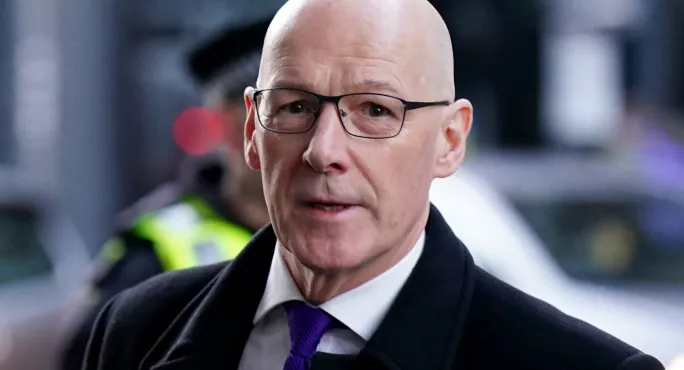Covid inquiry: Schools shut despite ‘unclear evidence’

Scottish ministers weighing up whether to close school buildings in March 2020 were advised at the time that the available evidence did not suggest this would slow transmission of Covid-19 “to a great extent”, the UK Covid-19 inquiry has heard.
Then education secretary and deputy first minister John Swinney announced on Thursday 19 March that schools would close a day later, after pupils and teachers left for the day on Friday 20 March.
In a paper submitted to the cabinet on 17 March 2020, advisers said the effect on transmission rates of the virus was “not yet clear”, and that it could in fact cause greater risk to older people seeing their grandchildren.
However, the paper also indicated that keeping school buildings open could put children with certain medical conditions - such as asthma - at risk, while some schools might be forced to close regardless of whether parents decided to keep pupils at home or teachers fell ill from the virus, both of which Mr Swinney said had begun to happen.
- Background: Covid - 10 days that shook Scottish education
- Related: The Covid-affected journey from primary school to Scotland’s senior phase
- News: Scottish students not ready for return to pre-Covid assessment, say teachers
- Long read: Ten educators share their experiences of Covid turmoil
- Covid inquiry: ‘Mistake’ to keep schools shut, says former children’s commissioner for England
The paper stated: “Very active consideration was being given to the possible closure of schools and other educational establishments, but the evidence was not yet clear.
“The epidemiological evidence did not suggest that this measure would slow the transmission of Covid-19 down to a great extent (and might in fact cause some additional infections - for example by increasing children’s exposure to grandparents over 70).”
‘Ferocious pace’
Giving evidence to the UK Covid-19 inquiry yesterday, Mr Swinney said events had been moving “at an absolutely ferocious pace” in the early days of the pandemic.
This was reflected in the paper, which states: “The debate on school opening was ongoing, and it seemed likely that the balance of evidence would change - possibly over the coming days.”
On the evening of 17 March 2020, Mr Swinney said education officials had spoken to the UK government and other devolved administrations, telling him they “thought it likely” that the Scientific Advisory Group for Emergencies (Sage) would advise closure, reversing its position from earlier that month.
The inquiry heard that data used to come to this position was not Scotland-specific.
Data was not Scotland-specific
Asked if English data was used for the opinion, Mr Swinney told the inquiry: “I don’t know that case, but obviously my officials were receiving advice from our clinical advisers - principally the chief medical officer [for Scotland, Catherine Calderwood] - at that time, who took the view that was reflected in the advice that came to me, that the appropriate step to take was to announce the closure of schools.”
Asked if he relied on the Sage advice to come to his decision, Mr Swinney said: “I did, that’s correct, yes.” But he “did not” have a chance to “interrogate Sage” about how the advice would apply to Scotland.
Lead counsel to the inquiry Jamie Dawson KC then asked if it was “appropriate” to base the decision to close schools on advice Mr Swinney had not scrutinised.
Mr Swinney responded: “I think it was. Because I think it was pretty clear that what was happening in London was coming our way and it would be coming our way pretty shortly thereafter.”
‘No time’ for equality impact assessment
Mr Swinney said the Scottish government had no time to carry out any equality impact assessment on children’s learning and development if schools were closed.
“At that moment we did not have the time or the opportunity to carry out the assessment,” he said.
Mr Dawson asked: “Does that mean none?” Mr Swinney replied: “That’s correct, yes.”
The former deputy first minister said the Scottish government encouraged local authorities to ensure appropriate provision of education was put in place to support children and young people.
The inquiry also heard that no impact assessment into children’s mental health due to the school closures was undertaken.
Mr Swinney said the Scottish government did not consider any other alternative to closing schools completely in March 2020.
No alternatives considered
He was asked by inquiry chair Baroness Hallett if they had ever considered any alternatives.
Mr Swinney said: “Not at that moment, my lady, because we felt that the situation we were facing was at such a magnitude. We did consider all of those questions at later stages for the return of pupils to blended learning.”
Mr Swinney said he had not had advice in front of him saying he could bring back schools earlier.
The inquiry heard that epidemiologist Professor Mark Woolhouse advised at the time in April and May 2020 that schools contributed little to the spread of the virus.
He argued repeatedly they could have reopened in May; Mr Dawson asked Mr Swinney why he did not take account of that advice.
Mr Swinney said: “I did not have advice in front of me saying I could bring schools back earlier.”
For the latest Scottish education news, analysis and features delivered directly to your inbox, sign up to Tes magazine’s The Week in Scotland newsletter
You need a Tes subscription to read this article
Subscribe now to read this article and get other subscriber-only content:
- Unlimited access to all Tes magazine content
- Exclusive subscriber-only stories
- Award-winning email newsletters
Already a subscriber? Log in
You need a subscription to read this article
Subscribe now to read this article and get other subscriber-only content, including:
- Unlimited access to all Tes magazine content
- Exclusive subscriber-only stories
- Award-winning email newsletters



